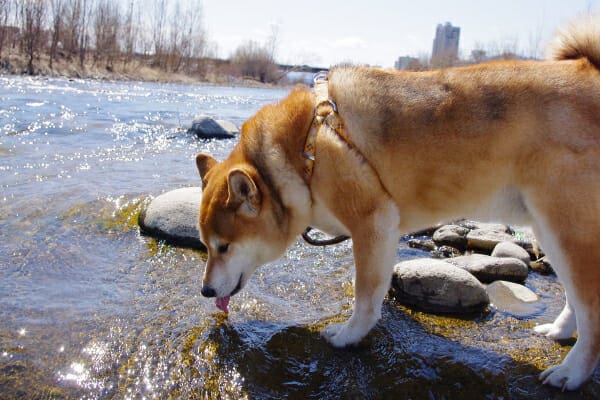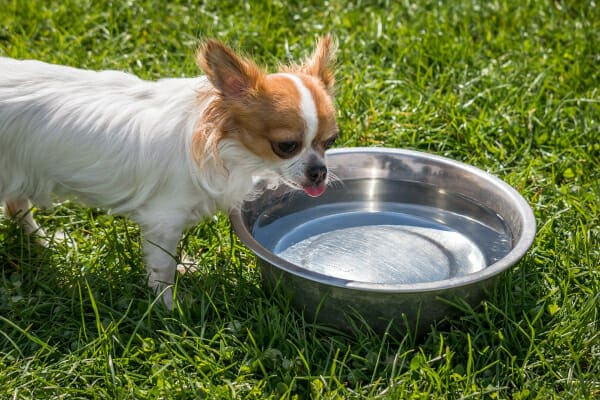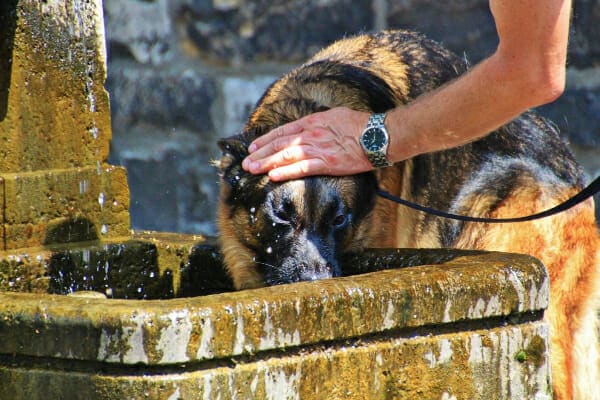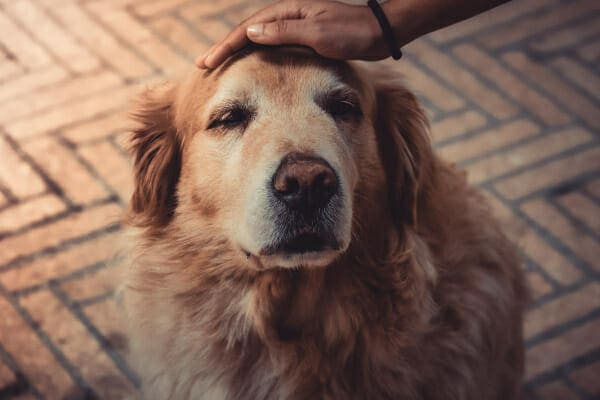Noticing increased thirst in dogs can be concerning for many dog parents. It is easy to wonder if this is just a variation of normal or a sign something is wrong. To help answer those questions, integrative veterinarian Dr. Julie Buzby explains how to know if your dog is drinking too much water and discusses five common causes of increased thirst.

Do you ever have days where even the smallest of tasks—like filling a dog’s water bowl—seem like a lot of work? You have to bend down to pick it up, walk over to the sink and wait forever for it be full. Then you must carefully walk the bowl back to where it belongs and set it down without sloshing too much water on the floor. If you have multiple dogs, it may seem like you spend half the day filling dog dishes.
The effort involved in the task of filling a water bowl became very apparent to one of my clients and dear friends a few months ago. She brought her sweet, senior Labrador Retriever named Felmon to see me for an exam because he was drinking about three times as much as usual. Felmon’s mom remarked that she couldn’t believe how much he was drinking and how often she had to let him outside to go to the bathroom.
She had already thought through some of the possible causes. It wasn’t summer time, so she didn’t think it was related to heat or temperature. And he hadn’t gotten any salty treats. Poor Felmon’s mom was very worried about what could be going on with him. I told her increased thirst could be a sign of many issues. To get to the bottom of it, I recommended some lab work to screen for the most common culprits.
What constitutes increased thirst in dogs?
Felmon’s mom had done a good job of qualifying that he was drinking about three times more than normal. But this brings up the question of how much water a dog should normally drink.
On average, most dogs need about one ounce of water per pound of body weight per day. Or, a little over one cup of water per 10 pounds of body weight every day.
Therefore, a 40-pound dog needs 40 ounces, or approximately 4 to 5 cups of water every day. Whereas, a 10-pound dog needs about 10 ounces, or approximately 1 to 2 cups, of water every day.
On some occasions, dogs may drink a little more or a little less than this average amount of water. For example, take a dog who just came back from running a few miles with you. It would be completely normal for him or her to drink extra water when you get home. And you will probably be drinking more water too.
On the other hand, consider a dog who was been snuggling on the couch with you. He or she may not drink as much water right then. These small variations in water consumption are normal. Usually they aren’t a cause for concern.
It is also important to note that normal water consumption can vary slightly from dog to dog. Some dogs may normally drink more than that one ounce per pound and others less than that amount. This is why can be helpful to establish about how much water your particular dog normally drinks. If you notice consistent and significant variations from that number that cannot be explained by diet, ambient temperature, exercise level, etc., this may indicate there is a bigger problem going on.
The terms polydipsia and polyuria
If your dog is regularly drinking more water than normal, he or she is showing increased thirst. The term for increased thirst is polydipsia. Remember, what goes in, must come out. So, when drinking increases, this typically increases urination too. Increased urination is called polyuria.

How do I know if my dog is too thirsty?
Depending on your lifestyle and the environment your dog lives in, it can be difficult to tell if your dog is drinking excessive amounts of water. One of the biggest things that will help you track your dog’s thirst levels is measuring how much water you are giving your dog every day. The easiest way to do that is to keep count of how many bowls of water you are filling up.
Some dogs may have water available free-choice through a large container like a gravity dish, water trough, or multiple dog bowls. In those cases, consider using one single bowl while you are monitoring your dog’s water intake.
Having multiple animals who share a dish can also make it a bit harder. You may need to temporarily separate your dogs to see who is actually drinking more water. Even if you can’t separate your dogs for a whole day, a few hours might be enough to monitor the water intake.
The other option would be to monitor how many times your dog goes to the bathroom. If your dog is urinating more than normal, it is likely that she or he is also drinking more water. This method is a bit less precise but still effective.
The most important thing to remember is that you do not want to limit your dog’s water intake. He or she should always have water available. If your dog is drinking more, his or her body needs it. Withholding water could lead to dehydration.
What else should I monitor if my dog has increased thirst?
If your dog is experiencing polydipsia, it is important to watch for other symptoms as well. When dogs have excessive thirst, it is usually because of an underlying condition. This can be especially true in our beloved senior dogs. Keep an eye out for these other symptoms that sometimes accompany increased thirst:
- Increased urination
- Straining to urinate
- Blood in urine
- Abnormal smell to urine
- Increased or decreased appetite
- Pot-bellied abdomen
- Lethargic dog
- Painful belly
- Dry, sticky-like gums
- Delayed skin tent
If you notice any of these symptoms and/or increased water consumption, promptly make an appointment with your vet. The sooner you figure out why your dog is drinking so much water the sooner your vet can start treatment.
Five causes of increased thirst in dogs
The list of potential causes of polydipsia is long, but I wanted to touch on five of the most common culprits. There are plenty of other conditions are not covered here. Please always consult with your veterinarian to reach a diagnosis.

1. Dehydration
Hot days, times of high activity levels, vomiting or diarrhea, and many other scenarios can all lead to dehydration. In all of those cases, it is very important that your dog has access to plenty of water. Dehydration can happen in any dog at any age. Just like in people, it can be very serious in dogs.
One way to assess for possible dehydration is to perform a skin tent test at home. This involves gently pinching and raising the skin between your dog’s shoulder blades. When you let go, the skin should “snap” back into place within two seconds or less. If the skin fold remains raised or goes back in place slowly, your dog may be dehydrated. You can practice this skin tent on the back of your own hand to get the hang of it before trying it on your dog.
If you suspect your dog is dehydrated at all, please call your veterinarian immediately. And remember to ensure he or she has clean, fresh water available at all times. For more details, check out this Veterinary Partner handout on first aid for dehydration in pets.
2. Urinary tract infection
Another reason your dog could be drinking more water is because he or she has a urinary tract infection (UTI in dogs). Urinary tract infections can be very painful for your dog and have the potential to become dangerous if left untreated. In addition to drinking extra water, you may notice your dog showing these other UTI signs:
- Frequent urination
- Urination of small volumes at a time
- Straining to urinate or difficulty urinating
- Bloody urine
- Foul smelling urine
- Having urinary accidents in the house
3. Kidney failure
The kidneys are a very important organ in your dog’s body. They help filter your dog’s blood to remove by-products or toxins. The kidneys also help regulate water and electrolyte balance in the body and produce urine. If the kidneys aren’t functioning properly, dogs need to drink more water to compensate. Kidney disease can lead to a cascade of other problems in dogs, especially senior dogs. This is why it is so important to monitor for signs of kidney disease.
With kidney disease, it is common to see increased thirst and urination. You also might notice signs such as:
- An arched back or discomfort when the belly is touched (i.e. abdominal pain)
- Vomiting
- Diarrhea
- Lethargy
- Loss of appetite
- Weakness
- Abnormal smelling breath
- High blood pressure (i.e. hypertension in dogs)

Kidney failure can happen suddenly (known as acute disease) or over a longer period of time (known as chronic kidney disease). Either type of kidney failure can be very serious and require consulting with your dog’s veterinarian.
4. Diabetes mellitus
This condition is caused by a decrease in insulin production or your dog’s body not responding appropriately to insulin. Insulin is necessary for sugar (also called glucose) to be taken into your dog’s cells and used as energy to help your dog’s organs function correctly. If there is not enough insulin or the body doesn’t respond to insulin well, then the blood sugar gets too high. This known as hyperglycemia.
Diabetes mellitus can happen in any dog, but it is more common in middle aged or senior dogs. It can be very serious if ignored and not managed appropriately. Thankfully, there are multiple signs you can monitor your dog for that will help you detect diabetes. These include:
- Increased thirst and urination
- Increased appetite
- “Sticky” urine (due to excess glucose in the urine)
- Lethargy or decreased energy
- Cataracts in dogs (i.e. opacity of the lens making the eye appear cloudy)
- Weight loss
As a side note, there is another condition called diabetes insipidus that can also cause increased thirst and increased urination. It is not the same as diabetes mellitus. In diabetes insipidus, the dog’s body isn’t making enough antidiuretics hormone (ADH) or the kidneys are not responding to ADH correctly.
Normally, ADH helps ensure that the kidneys concentrate the urine appropriately. However, dogs with diabetes insipidus are unable to concentrate (i.e. pull water out of) their urine. Thus, they lose large volumes of water in their urine and must drink excessively to keep up with that loss.
5. Cushing’s disease
Dogs who have hyperadrenocorticism (i.e. Cushing’s disease in dogs) also tend to drink more water and urinate more frequently. Cushing’s disease occurs when the adrenal glands produce too much of a steroid hormone known as cortisol. This hormone, cortisol, is necessary for helping to regulating many body functions including glucose levels, metabolism, and the immune system. However, too much of it is a bad thing.
Cushing’s may be caused by a tumor of the pituitary gland (i.e. small gland in the brain) which sends too many signals to the adrenal gland to make cortisol or an adrenal tumor which over produces cortisol.
In some cases, extended use of steroids such as prednisone for dogs can also lead to a form of Cushing’s disease called iatrogenic Cushing’s disease. (As a side note, it is fairly common to see increased thirst and urination in dogs taking prednisone but that doesn’t mean they have iatrogenic Cushing’s disease.) Thus, it is always important to carefully monitor your dog whenever he or she is taking steroids.
Cushing’s disease can cause multiple symptoms including:
- Increased thirst and increased urination
- Increased appetite
- Pot-bellied appearance
- Decreased energy
- Abnormal hair loss
- Heat intolerance

What can I expect at the veterinarian’s office?
As you can see, there are a variety of medical conditions that cause increased thirst and urination in dogs, and this isn’t even an exhaustive list. Prior to coming to the veterinary appointment, consider tracking not only your dog’s water consumption but also any other symptoms. This information can help guide the diagnostic process.
When you first arrive, your veterinarian will perform a nose-to-tail physical exam to look for any changes or abnormalities. Based on the exam and the history you provide, your vet will most likely recommend a few different tests to help determine the cause of excessive thirst.
Baseline tests
One of the first tests that your veterinarian might request is a complete blood count (CBC) and biochemistry profile. These are both basic blood tests that vets often run to gather information on sick dogs. The CBC will look at your dog’s red and white blood cells and platelets. The red cells numbers will help indicate if your dog is anemic. Changes in the white blood cells numbers can indicate an infection is present or point to several other conditions. It is also helpful to know if your dog has an appropriate number of platelets for blood clotting.
The chemistry profile can offer a lot of information to your veterinarian. It will help assess if your dog’s kidneys and liver are working properly. This is important because both kidney disease and liver disease in dogs may affect a dog’s water consumption. There are also different markers on the chemistry profile that could indicate if your dog has diabetes mellitus, Cushing’s disease, or other conditions that may lead to increased thirst and urination.
Another test that your veterinarian will likely recommend is a urinalysis. This will analyze how well your dog’s kidneys are concentrating urine. It will also look for signs of blood or crystals in the urine which could be an indication of bladder stones or a UTI. A urinalysis can also detect abnormal levels of protein in the urine, which may be related to kidney disease. Plus, the presence of glucose in the urine could indicate diabetes mellitus.
Additional tests
Depending on the results of these tests and the condition(s) your veterinarian suspects, there are other more specific blood tests he or she may request as well. For example, if the results of the chemistry profile are suspicious for Cushing’s disease, your vet may want to run a confirmatory test such as an ACTH stimulation or low dose dexamethasone suppression test.
In addition to blood tests, your veterinarian may want to perform X-rays or an ultrasound. These tests would help look at your dog’s organs, including the kidneys, liver, spleen, and adrenal glands. Occasionally, your vet may also refer your dog to a specialist for specialized testing.

What is the treatment for increased thirst in dogs?
Once the veterinarian determines why your dog is drinking so much water, he or she will recommend a course of treatment specific to your dog’s condition. Treatment for the five common conditions mentioned in this article includes:
Dehydration
Depending on the degree of dehydration, your vet may hospitalize your dog on intravenous (IV) fluids or give your dog some subcutaneous (SQ) fluids (i.e. fluids under the skin) and then send your dog home. It is also important to address the underlying cause of the dehydration. This may include medications to decrease vomiting and diarrhea or treatment of whatever other condition lead to the dehydration.
Urinary tract infection
Typically a UTI is caused by bacteria so the treatment will involve a course of antibiotics. Your vet may also prescribe anti-inflammatory and pain medications if indicated. It may also be helpful to increase your dog’s water intake by adding water to the dry food, giving some canned food, and/or ensuring he or she always has fresh water available.
Kidney failure
The exact treatment will depend on the degree of kidney failure and how your dog is doing. It will often involve IV fluids (for more severe cases) or SQ fluids (for more mild cases). Some dogs also benefit from a specially formulated diet, or medications to control phosphorus levels, decrease protein loss in the urine, or reduce nausea. If your dog’s appetite is poor, your vet might also recommend an appetite stimulant for dogs.
Diabetes mellitus
Most dogs who have diabetes mellitus will respond best to daily or twice daily insulin injections given at the same time as meals. This takes the place of the insulin your dog’s pancreas would normally release in response to eating. Your vet may also recommend specially formulated diets and weight loss for overweight dogs (find out if your dog is overweight by determining your dog’s body condition score).

Cushing’s disease
There are several medications your vet may use to decrease cortisol levels in dogs who have Cushing’s disease. These include Lysodren (mitotane), Vetoryl (trilostane), or selegiline. Occasionally, surgery to remove an adrenal tumor may be an option, but it is a fairly risky procedure.
Many of the conditions that cause increased thirst (especially kidney failure, diabetes mellitus, and Cushing’s disease) will require periodic monitoring and follow-up with the veterinarian. Stay in close contact with your vet about any changes you notice in your dog’s behavior, symptoms, or water intake during the treatment period. Your vet is a great ally when it comes to helping your dog feel his or her best.
Back to Felmon
You may be wondering what happened to Felmon. Well, after multiple blood tests and ultrasounds, I diagnosed him with Cushing’s disease and started him on medication to help him feel better. While he still has some hard days, Felmon is happily living out his senior years! His owner monitors him very closely for any changes and updates me regularly about how he is feeling.
If you notice that your dog is drinking more water or having other symptoms, it is important to consult your veterinarian. Some causes of increased water intake can be life threatening and early treatment can make a big difference in the outcome for your dog.
To help your veterinarian, consider measuring your dog’s water intake prior to the appointment (if possible—but don’t delay an appointment just so you can do this). And in the meantime, ensure that your dog’s bowl is always full and he or she has lots of chances to go outside to urinate.
While noticing your dog is drinking water like crazy can be concerning, know that your veterinarian is here to help get to the bottom of the issue and figure out a treatment plan. Sometimes, such as in cases of severe kidney failure, water consumption tends to stay high. But even then, you and your vet can work together to give your dog the happiest, most comfortable life you can.
Often though, appropriate therapy will help your dog’s water consumption return to normal (or at least closer to normal). So don’t lose hope—chances are good you won’t always be constantly filling your dog’s water dish and taking him or her outside for bathroom breaks. It will get better.
Have you ever noticed increased thirst and urination in your dog? What was the cause?
Please comment below.


My dog started drinking excessively in 90+ degree Weather ( I live in Maine) the next day he was lethargic, vomited bile, and was not interested in eating I made a emergency same day vet appointment
He was diagnosed with hypercalcemia and lymphoma and rushed to a specialty hospital where he rapidly declined With heroic efforts he was rescued with Chemotherapy He lived another joyful year until his lymphoma returned and did not go into a second recession with addition chemo
Hi Martha,
I remember you shared his story on the lymphoma article blog last year. I am so sorry for your loss but what a blessing you gained another year with your sweet boy. Didn’t you also have a girl Boxer that lived with epilepsy? Wishing you comfort and peace as you continue life’s journey. Bless you. ♥
My 3 yr old dog Lucy was diagnosed with a Liver Shunt when she was about 3 months old. We had that surgically corrected, and she has been on a protein restricted diet and Sucralose for life since. Even though the vet checks her blood regularly and says it’s higher than normal but nothing to worry about. She’s a normal dog in every way, except she still drinks a lot of water, and urinates a lot. Is this ok, or should something else be done?
Hi Dawn,
I am glad Lucy seems to be doing well other than her increased thirst and urination. This could be normal for her with the genetic issues she was born with. If you have any lingering concerns, don’t hesitate to discuss them with your vet. You can also ask for a consultation with an internal medicine specialist if needed. Hoping Lucy will continue to thrive and wishing you both many happy years ahead. Take care and good luck!
Hi,
My dog is 12 years old girl and did the Gingival hyperplasia removal surgery, teeth cleaning and teeth removal on Nov 8. After the surgery, she walked around at home 24 hours without sleep. This situation lasted 3 days and got back to normal. But she got urinary incontinence after 7 days of the surgery. She drinks much water and cannot control the pee. I think it caused by Anesthetic overdose. But the vet said the possibility is very lower. The vet said she is old and neutered, so usually is the sphincter relaxation and suggested gave her medicine PROIN chewable tablets. I tried the medicine works but I donot think it is caused by sphincter relaxation. Because she is normal before the surgery. Her blood test and urine test are normal as well. She still drinks much water than before but less a little bit compare with last month. Pls could you give some suggestions? Thank you.
Hi Lisa,
I am sorry your girl is having these urinary issues. I understand why you are concerned and think it is good you are searching for answers. I wish I could be more help but without examining your pup myself it is hard to make specific conclusions. I am not familiar with anesthesia causing urinary incontinence and think it would be wise to do some general testing and work up this problem. Forgive me if this is what you mentioned in your comment as I am unsure of the timeline, but has your dog had any blood work run since the dental procedure was performed? That would be my first suggestion. This way you can see if anything has changed significantly from the pre-anesthetic lab work. Hoping you can find the answers you need to give your sweet girl relief. Wishing you both the best and praying for a positive outcome.
Not a senior dog but my 2 year old sheepadoodle recently got put on steroids for ear inflammation, however they caused him to become incontinent. we finished the course over 10 days ago but he’s still drinking and peeing excessively, he’s scheduled for vet but just wondering if this could be the steroids triggered something?
Hi Kat,
I understand your concern with this excessive thirst and urination in your young dog. Any unwanted side effects of steroid administration usually resolve once the medication is discontinued. It is a bit odd that your pup is still having these issues even though he has finished his course of treatment. Since I haven’t examined him myself, I can’t make specific conclusions. I am glad you scheduled a visit to your vet and hope they can find some answers. They will probably recommend some testing and recommend collecting a blood and/or urine sample. How are things today?
Have you had your pet tested for Lyme / tick disease? As I have been searching for answers for my own dog, I found information saying that if a dog develops symptoms of kidney disease following any treatment with corticosteroids, tick disease should be suspected. You could suggest getting further testing for that, just to rule it out. Good luck!! Please post an update whenever you have it.
I am not a vet, but passionate about googling information and working with my dog’s vet to come up with the best testing and treatment for my pup 🙂
A couple of months ago our 8-year-old pit mix Quigley suddenly developed extreme thirst, excessive urination, and rapid weight loss. The vet ran tests immediately, diagnosed diabetes mellitus, and prescribed twice-daily Vetsulin. We take him in every 2-3 weeks to determine if his dosage is correct. (it was increased 2 weeks ago; next appt. Is in 6 days). His weight seems to be improving, but the extreme thirst and frequent urination have not lessened.
Hi Martha,
I am sorry your senior guy has diabetes. It can take a while to find the best insulin dose and it sounds like you are headed in the right direction. Once your vet is happy with the dosage and your dog’s blood sugar stabilizes, you should notice the increased thirst and urination start to resolve. Hoping Quigley’s next appointment goes well, and you get some good news. Best wishes to you and your sweet boy.
my dog is 12, last week he started drinking water like crazy. we went to vet…he does not have diabetes. the vet did a thorough physical exam, did blood work and said he’s not concerned about anything. I noticed his liver levels were a little (I’m def not a vet) what’s the range? any thoughts on why his thirst is so different? nothing in his life has changed..is there any way to help him drink less? any insight would Be appreciated
Hi Melissa,
You are right to be concerned about this change in your dog’s water consumption. It sounds like your vet did all of the standard testing and was left with more questions than answers. Even though no abnormalities were found, it might be a good idea to pursue some additional testing. Maybe you can talk with your vet about abdominal ultrasound? You could also request a consult with a specialist. I hope you can find the answers you need to make sure your senior guy is healthy and stable. Keep us updated!
Hello! I just adopted a deaf puppy and we love him to death! He is drinking an entire bowl of water in 1 sitting and if there is water there he will just constantly drink. He isn’t lethargic and shows no other symptoms. He does urinate quite frequently, sometimes every 10 minutes. He goes to the vet tomorrow for his puppy check up and going to mention the urination. Any other thoughts?
Hi Zack,
I think you have the right idea about discussing this issue with your vet. Excessive drinking and urination can be a symptom of MANY things. Your vet will probably recommend some lab work to narrow down the cause. I hope you find the answers you are looking for. Best wishes to you and your pup!
My daughter adopted a shelter dog 5 days ago. The dog is female, is around 1 year old, and was spayed 7 days ago. The dog came for a visit today, and she exhibited excessive thirst and urination. I suggested my daughter get her into the vet soon. Do you have any ideas? Other than the excessive thirst and urination, the dog doesn’t have any other symptoms and has plenty of young dog energy. Thanks!
Hi Sheryl,
I am glad you advised your daughter to have her new dog examined by a vet. Unfortunately, without seeing the pup myself, I can’t make specific conclusions. These symptoms can be caused by any number of conditions or diseases. The first line of testing will probably include bloodwork and a urinalysis. Further testing recommendations and treatment will depend on the results obtained. Hoping this is something simple like a urinary tract infection! Wishing everyone involved the best of luck.
my 14 yr Chihuahua got a treat by a guest. pancake and egg. now he is extra thirsty drinking till tummy full by night. seems to eat ok and potties but going out a little more. did his treat cause a problem. perhaps syrup push blood sugar high. if so will it return to normal after a few days.
Hi Sharon,
I am sorry your little pup is having some issues since being offered table food. Since I haven’t personally examined your dog, I can’t make specific conclusions or recommendations about his health. Table food can cause any number if GI issues including pancreatitis. Also, there is a sugar substitute used in many foods that is toxic to dogs called Xylitol. I am not sure if the syrup had Xylitol in it, but exposure to this could be cause for an emergency visit. High blood sugar that occurs after ingesting something sweet like syrup should resolve in minutes. If these worrisome symptoms are persisting for more than a day, then you are dealing with something other than high blood sugar. Your best bet is to call your veterinarian and discuss these concerns. They can let you know if your senior guy needs to be evaluated.
Hi there
My dear lab has suspected Gollp. I haven’t had exploratory examination to diagnose as she is 14 but we have adapted her feeding and care correctly,
In last few months she has been drinking excessively and urinating more.
Vet has done both cushings tests, negative. Blood profile normal except one marker in liver, pancreatitis test just showing abnormal, we are doing ultrasound ph abdomen Monday to see if there’s anything That’s irritating pancreas that’s the primary cause before treating for pancreatitis.
She’s eating well, shorter walks and panting more.
Would Gollp on its own cause the excessive drinking and peeing
At wits end here to know more
Thanks
Hi Pippa,
I understand your concern for your senior girl and these issues with her health. I am glad you are being very proactive and partnering with your vet to go through the necessary diagnostic testing. I am curious to know what the results of the ultrasound revealed. I am not aware of GOLPP causing increased thirst and urination. If it was just incontinence type issues, then maybe I would think it could be related. GOLPP is a dysfunction of some of the nerves and nerve pathways and incontinence can be caused by an issue with the nerves that control the bladder and urination. But an issue with nerve function should not cause excessive drinking. It may be a good idea to schedule a consult with a veterinary internal medicine specialist. They have lots of experience with complicated cases and might have treatment recommendations that could be cost prohibitive in general practice. I hope you find the answers you need to make the best choices for you and your sweet girl. Wishing you both the best and feel free to leave an update if you have a chance.
Dear Pippa,
I am very curious about the outcome of your Lab’s condition. Do you have any updates? We seem to be going through exactly the same with our Lab.
Much appreciated!
Nadine
Hi, my 110 pound 12 year old lab has recently started drinking large amounts of water. She would let us know when she wanted outside to pee regularly, but now she has started peeing all over my house ( very large amounts) to the point she has ruined my flooring. She has trouble walking upstairs, has a goofball size lump on her belly, one on her legs and recently I’ve been finding quite a few ticks on her which I removed using tweezers. She just started eating our cats food but also eats her own. She has never peed on the floor before this all started about a month ago. When she goes outside to the bathroom I’ve noticed that while she pee’s sometimes whimpers. She has a sore on her elbow that is opening and leaky as well.
Hi Tonya,
You are right to be concerned about these worrisome symptoms in your senior girl. I highly recommend you have her examined by your vet as soon as possible. There are so many possible causes from endocrine disorders to bladder stones. Also, your vet can evaluate the lumps and let you know if they should be removed due to suspected cancer. The tick issue can be resolved with many different parasite preventatives that can be purchased from your vet clinic. I have no doubt that with the support of your veterinarian, most if not all of these issues can be resolved. I hope you find the treatments that work best for you and your big girl. Best wishes!
I have a 12 year old Australian Shepherd that began the excessive water drinking and urination a couple of months ago. The vet has done blood work, urinalysis, ultrasound, testing for Cushings and has not found the cause yet. Blood work showed Lipase level of 1689, which usually points to pancreatitis, but he doesn’t have any other symptoms. The next step is to see an internist for a second opinion, but I hate to put him through any more testing. Any suggestions?
Hi Angie,
Your senior guy sounds like a complicated case without clear answers for what is causing his worrisome symptoms. Since I haven’t examined your dog myself, it is hard to make specific recommendations. I do think the best option is to schedule a consult with an internal medicine specialist. You can let them know your concerns about further testing and wanting to minimize stress for your pup. They should be able to honor your request and let you know what the options are and what they recommend. I hope you can find the answers you need to restore your sweet boy’s quality of life. Best wishes and praying for a favorable outcome.
Our 12 1/2 year old Bassett Hound is going through this now. We’ve done the lab work at the vet and have ruled out kidney disease, diabetes and Cushings. She’s drinking so excessively she’s having to potty every 10 min if not sooner. She’s also dropped from 41 pounds to 38 in the last 6 months. Our vet thinks it could be a brain tumor causing the increased thirst. Would love any other suggestions to investigate. Our vet seems to think that the causes left as a possibility are not likely curable so wants us to realize that before we choose to spend a lot to really figure it out.
Hi Stacey,
I am sorry your Bassett is struggling with excessive thirst and urination. It sounds like your vet has performed the standard testing recommended for this issue and any other testing may have to be pursued with a veterinary internal medicine specialist. It is true that you could end up spending quite a bit to find a diagnosis just to learn that there is no treatment available. I recommend you talk to the specialist and discuss your concerns about your dog and the cost associated with testing. They can start with more simple tests first and you can make the decision to stop or continue at any point along the way. The goal is to work together as a team to make the best choices for you and your sweet girl. I hope you can find the answers you are looking for. I wish you the best as you navigate this difficult road ahead.
Hi,
We have a 13 year old bassett which is also drinking a lot and urinating a lot more, she is also very grumpy and is off her food. she is also licking her bed excessively.
Have u done any more tests to fid out the cause as would be really interested to see what it comes back with.
With my bassett being so old, we are unsure what to do as regards to how far to go with testing.
Have not taken dog yet to the vet because I don’t have any money till the 1st of the month has a significant amount of water increase in the last 3 to 4 days now also has lost a significant amount of hair loss on her head which my other dog lickes it all the time was treated for a severe ear infection and has a cauliflower ear because of that and other dog will not leave it alone always licking it causing it to blead all the time and when I catch him licking her I try to stop and if she’s not been licked it’s just a loss of hair and pink sore on her forehead and ear to stay raw and ugly
Hi Vickie,
It does sounds like there is something new happening with your girl that needs to be evaluated by your vet. I hope you can get her seen quickly and start the diagnostic testing process. I wish you both the best and pray she receives a diagnosis that offers hope for a happy future.